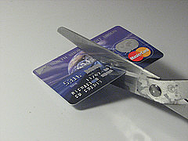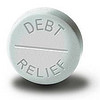 If I just make the minimum payments due on my credit cards, will I ever pay them off?
If I just make the minimum payments due on my credit cards, will I ever pay them off?
Not likely!
The credit card industry has successfully created an "easy pay plan" for consumers that almost guarantees that they will never pay off their credit cards.
How?
By charging a very high interest rate and only requiring a very low (too low) minimum payment.
Example:
- Let's say you have a credit card with a balance of $3,000.
- The Annual Percentage Rate is 21%.
- The minimum payment this card requires is 2.02% of the balance, or in this case, ($3,000 x .0202) = $60.60.
- You make a payment of $60.60 to XYZ Visa.
Next month, you get your bill and unlike most consumers, you take a closer look and discover:
Previous Balance $3,000.00
Interest and fees (for this example, we won't add any late or over-the-limit fees) $ 51.78
You mailed in $60.60 as a minimum payment -$ 60.60
Only to discover that your NEW BALANCE is $2,991.18
Your right! Your balance went down by only $8.82!
What happened?
You just fell prey to the credit card industry's "scam" of letting consumers think that if they just make the minimum payment on their credit cards, they'll be OK.
Let's take a closer look:
Most credit cards use a formula that calculates the Average Daily Balance (ADB) and Daily Periodic Interest (DPI) to determine how much of your payment goes to INTEREST and how much actually goes to the BALANCE. There are other methods, but this is normal.
To determine your ADB and DPI:
If your total balance was $3,000, to find the Average Daily Balance (ADB), divide the total balance by the number of days since your last payment was applied. In this case:
$3,000 divided by 30 days = ADB of $100
Now determine the Daily Periodic Interest (DPI) they charged you:
Take the Annual Percentage Rate (APR) or .21 and divided by 365 (days in a year of course). In our case:
.21 divided by 365 = .0005753 = DPI
Now find the Average Daily Interest (ADI):
To find out how much interest you actually paid per day:
DPI .0005753 X ADB $100 X 30 days = ADI or 1.7259
Finally, to determine how much interest you paid:
ADI 1.7259 X 30 days = $51.78
SHOCKED! YOU SHOULD BE!
It doesn't take a rocket scientist to understand that at this rate, it may take a lifetime to pay of this debt if all you do is make the minimum payment!
For FREE information about how to pay off your credit cards in a fraction of the time and save thousands of dollars in interest and fees, please click here. 








 What is the best debt elimination plan?
What is the best debt elimination plan? A prospect wrote, "Christmas is over and I charged too much!" Can you help with debt settlement advice?
A prospect wrote, "Christmas is over and I charged too much!" Can you help with debt settlement advice? When faced with too much credit card debt, you really only have 5 options:
When faced with too much credit card debt, you really only have 5 options:

